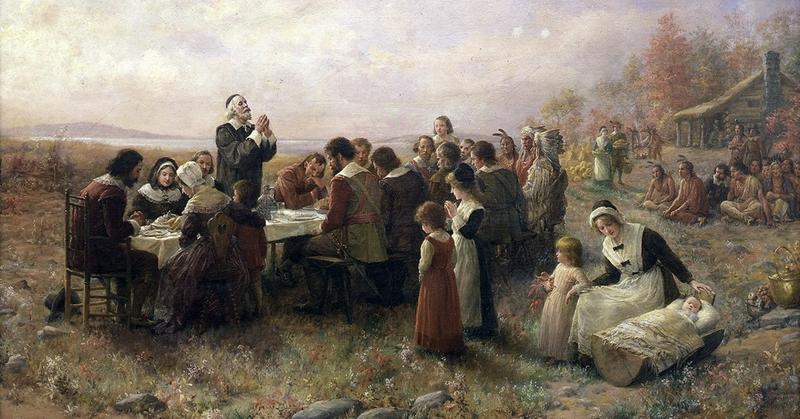When Southern States Considered Thanksgiving An Attack From The North
By | November 25, 2020

Today, Thanksgiving is enjoyed by people from different cultures and backgrounds across America, but in the 19th century, this turkey-based holiday was seen as little more than an excuse for politicians to push Northern rhetoric on the South. The culture war of Thanksgiving in the South extended to every part of the holiday, from the food to the good tidings and even the date.
The Push For Thanksgiving (And Abolition)
The first American Thanksgiving in the Plymouth Colony in 1621 transitioned into a Puritan day of gratitude to God in New England during the 17th century, and it continued to evolve through the 18th and 19th centuries as celebrants focused less on prayer and more on food and togetherness. At the time, there was no particular day on which Thanksgiving was celebrated, but many state governors in the North mandated a statewide holiday in late November or early December.
The regional nature of Thanksgiving was both challenged and upheld by Sarah Josepha Hale, a Northern writer who loved Thanksgiving. In 1825, she started writing letters to Northern governors, asking that they band together and create a national day of giving thanks, and if that day could be the final Thursday of November, that would be great. As the editor of Godey's Lady Book, a magazine with national distribution, she also used up pages and pages to pitch Thanksgiving to the American people.
By the 1850s, Hale's campaign inspired some 29 states to get into the Thanksgiving spirit, but at the same time she was preaching the gospel of friendship around the dinner table, other Northerners were angering the South with their push for abolition. It didn't take long before Hale's call for brotherhood was mixed up with anti-slavery sentiment, and Southern leaders wanted none of it.

The Squash Controversy
Through her cookbook, American Cookery, Hale created the mythology of the Thanksgiving meal and unknowingly fired the first shot of a culture war. With recipes that called for squash and molasses—traditional New England staples—Hale sought to inspire home cooks to create the same sense of warmth around their dining tables that she came to love while growing up in New Hampshire, but her good intentions were seen as an attempt to erase Southern culinary culture.
By the time Hale had begun to campaign for her very New England version of Thanksgiving, the South had already developed a firm familial dining culture based on greens, grits, biscuits, fried chicken, and other items readily available in the region. It wasn't until 1976, with the release of The Taste Of Country Cooking by Edna Lewis, that Americans outside the South even understood the region's rich culinary history, but whether Southern cooks weren't aware of the North's ignorance or simply condemned it just the same, they didn't take kindly to being told they were feeding their families incorrectly.

The Suspicious South
Relations between the North and South were at an all-time low when Hale released her cookbook in 1841. With 20 years to go before the Civil War, tensions were boiling over in strange ways, and one of the strangest was the battle of words that erupted over the District of Columbia's "repugnant" declaration of Thanksgiving.
In 1856, an editorial in the Richmond Whig argued that Thanksgiving was nothing more than an attempt to push Northern values (read: abolitionism) onto the South as well as a dastardly plot to plunge the region into alcoholism and depravity. "They have [a] crazy society within New England's limits," it read, "where they have been productive of little but mischief—of unadulterated and unmistakable injuries to sound religion, morals, and patriotism." Governor Wise of Virginia responded to Hale's personal call for Thanksgiving that he wanted nothing to do with "this theatrical national claptrap of Thanksgiving, which has aided other causes in setting thousands of pulpits to preaching 'Christian politics.'"

The South Concedes ... Mostly
Decades of campaigning paid off, however. In the middle of the Civil War, President Lincoln declared the first national Thanksgiving on the last Thursday of November in 1863, urging "all those who have become widows, orphans, mourners, or sufferers, in the lamentable civil strife in which we are unavoidably engaged" to take part in the holiday. The speech didn't exactly have its desired effect, mostly just annoying prosperous members of the South who were already not happy about Lincoln telling them what to do. Confederate leaders refused to declare a day of thanksgiving during the war, and the attitude continued well after the Civil War ended.
As the sounds of the battlefield faded into the Reconstruction Era, some of its leaders agreed to celebrate Thanksgiving in the South but thumbed their noses at national unity by changing the date. Southern cooks also adapted many of Hale's recipes to fit local tastes and traditions: Pumpkin pie became sweet potato pie, and bourbon, walnuts, and pecans made their way into the meal. In 1941, Congress officially declared Thanksgiving a national holiday, and while Hale's brand of New England regionalism became the "official" version of Thanksgiving, home cooks across the country still put their own regional spins on Hale's recipes, choosing to focus on the spirit of Thanksgiving rather than any particular pie.

